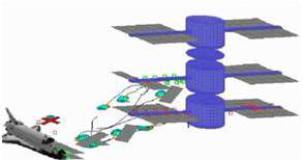feature | Teamrobotik
Engineering applications of self-organization and pattern formation principles
 von Jens Starke
von Jens Starke
Self-organized modular approaches proved in nature to be robust and optimal and are therefore also a promising strategy in engineering. The potential of self-organization and pattern formation principles in engineering will be demonstrated for future concepts of flexible and modular manufacturing processes. In particular, a model of flexible manufacturing is considered which is based on time-dependent robot-target assignment problems where robot teams have to serve manufacturing targets in an optimal way. Feasibility of the self-organized solutions can be guaranteed even for unpredictable situations like sudden changes in the demands or breakdowns of robots. As example an uncrewed space mission is visualized in a simulation where robots build a space station. The suggested approach is not only promising for various types of complex manufacturing but shows in addition a way how to utilize self-organization and pattern formation principles, in particular selection processes for engineering problems. This includes especially situations with required flexible, modular and decentralized structures where the total process has to continue even if the risk of partial failures is high like in uncrewed space missions or in industrial manufacturing like production with high variety, small batch size and short delivery periods. The presented results provide a basis for a wide range of applications and further detailed investigations of simulations or real experiments as well as analytical studies.
Vortrag von Jens Starke im Rahmen des Workshops „Synergie. Konzepte - Techniken - Perspektiven“ (29.06-01.07.2011) zum Anhören
Zitierung:
Jens Starke: Engineering applications of self-organization and pattern formation principles, in: Tatjana Petzer (Hg.): SynergieWissen. Interdisziplinäres Forum & Open Access Lexikon, 01.11.2012, http://www.synergiewissen.de